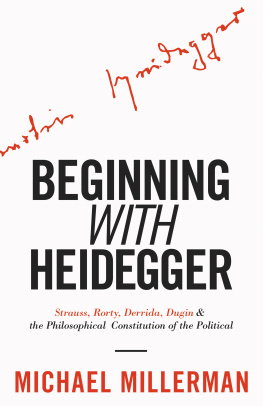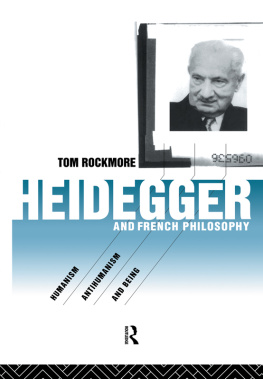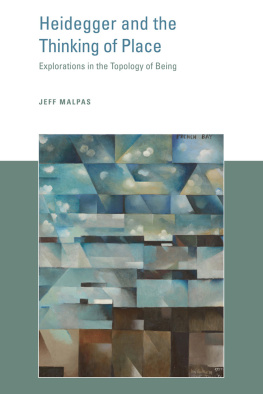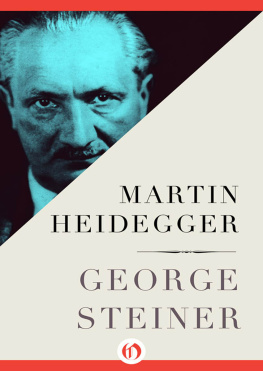Millerman - Beginning with Heidegger
Here you can read online Millerman - Beginning with Heidegger full text of the book (entire story) in english for free. Download pdf and epub, get meaning, cover and reviews about this ebook. publisher: Arktos Media Ltd., genre: Politics. Description of the work, (preface) as well as reviews are available. Best literature library LitArk.com created for fans of good reading and offers a wide selection of genres:
Romance novel
Science fiction
Adventure
Detective
Science
History
Home and family
Prose
Art
Politics
Computer
Non-fiction
Religion
Business
Children
Humor
Choose a favorite category and find really read worthwhile books. Enjoy immersion in the world of imagination, feel the emotions of the characters or learn something new for yourself, make an fascinating discovery.
Beginning with Heidegger: summary, description and annotation
We offer to read an annotation, description, summary or preface (depends on what the author of the book "Beginning with Heidegger" wrote himself). If you haven't found the necessary information about the book — write in the comments, we will try to find it.
Beginning with Heidegger — read online for free the complete book (whole text) full work
Below is the text of the book, divided by pages. System saving the place of the last page read, allows you to conveniently read the book "Beginning with Heidegger" online for free, without having to search again every time where you left off. Put a bookmark, and you can go to the page where you finished reading at any time.
Font size:
Interval:
Bookmark:
Arktos
London 2020

Copyright 2020 by Arktos Media Ltd.
All rights reserved. No part of this book may be reproduced or utilised in any form or by any means (whether electronic or mechanical), including photocopying, recording or by any information storage and retrieval system, without permission in writing from the publisher.
Arktos.com | Facebook | Twitter | Instagram | Gab.ai | Minds.com | YouTube
ISBN
978-1-912975-79-2 (Softcover)
978-1-912975-80-8 (Hardback)
978-1-912975-81-5 (Ebook)
Editing
John Sebastian Cumpston
Cover and Layout
Tor Westman
This book is based upon my doctoral dissertation. In it I examine how Leo Strauss, Richard Rorty, Jacques Derrida, and Alexander Dugin responded to Martin Heideggers inceptual thought in defining and relating philosophy and the political. The Introduction discusses the general concepts, motivations, and aims of this study. Chapter One provides a prcis of Heideggers philosophy from The History of the Concept of Time to his middle-period writings. Chapter Two compares Strauss and Heidegger on the Idea of the Good in Plato. Chapter Three argues that Rorty is prevented from a philosophically serious reading of Heidegger by his a priori social-democratic commitments. Chapter Four distinguishes the spaces of Derridean and Heideggerian political philosophy. Chapter Five is an account of Dugins embrace and extension of Heideggers inceptual thought. The Conclusion analyses obstacles blocking access to Heidegger in political theory and argues for a new way forward.
For Ruth and Lola
Since the beginning of the twentieth century, the rational foundations of liberal democracy have been attacked and undermined by anti-liberal philosophers. Foremost among them is Martin Heidegger. Heidegger and the philosophical revolution he initiated posed such a challenge to liberal democracy that more than a few of its defenders were faced with a dilemma once expressed by Leo Strauss: the crisis of rational liberalism needs to be solved with the help of great thinkers, but the only great thinker of the time, Heidegger, is a critic of rational liberalism.
However, despite work on Heideggers philosophical challenge to liberalism that focuses on isolated geographical regions or political perspectives, scholars to date have done little to compare the philosophical and political significance of responses to Heidegger across a broader geographical and political spectrum. At the same time, Heidegger has become increasingly relevant to those who wish to attack liberalism, as well as to those who wish to defend it. The result is that the political possibilities of Heideggerian philosophy have not been grasped as completely as can be done through a comparative approach. To fill the gap, the present work brings together four major responses from four regionsGermany, America, France, and Russiaencompassing political positions spanning far left to far right, to show how Leo Strauss, Richard Rorty, Jacques Derrida, and Alexander Dugin constitute their understanding of philosophy and the political, as well as the relationship between the two, in response to the challenge of Heidegger. This broad, comparative approach to encounters with Heidegger across a geographic and political spectrum will clarify the underlying self-understanding of the post-Heideggerian left and right as well as the liberal center and bring into relief the theoretical issue of competing philosophical constitutions of the political.
Heidegger wrote his best-known works in the 1920s and 1930s in Germany. In his lifetime he was widely renowned for his studies of ancient Greek philosophers and for his ideas about the nature of philosophy and man. He left an indelible impression on a generation of students, many of whom, fleeing the Nazis, were later to make names for themselves in America or elsewhere. Through his students works and his own texts, including books and lecture transcripts, he also influenced many political theorists outside of Germany who had never studied directly with him. It is widely acknowledged that Heidegger played a dominant role in shaping the intellectual landscape of the twentieth century. It is certainly true that he has shaped the field of political theory.
One of Heideggers main ideas is that the major concepts from the Western philosophical tradition are historically constituted, rather than universal or timelessly true. Today this appears trivial. But that is in part evidence of Heideggers influence. Previously, concepts like truth and right were regarded as stable, universal, or eternal, and they served to an extent as foundational concepts used to justify social and political orders. Heidegger, however, showed how such concepts arise from finitude and history, and even from the inauthentic relationship of man to his own true self. For many among his politically minded readers, his philosophical ideas promised liberation from a set of conceptual constraints, and indeed from the constraining nature of concepts as such, a simultaneously philosophical and political liberation. Derridas project of deconstruction, for instance, which emphasizes the exclusions that conceptual arrangements effect, owes much to Heidegger. Richard Rorty, an American neo-pragmatist, used Heideggers ideas about history, finitude, and the instability of traditional concepts to support social-democratic politics, arguing that foundational master concepts tend to underpin reactionary politics, whereas a post-truth attitude can facilitate freedom and creativity.
Unlike Derrida and Rorty, each of whom embraces some of the consequences of Heideggers argumentputting them into the service of more or less leftist political aimsLeo Strauss, a Jewish German migr to America, was worried about the consequences for liberal democracy and Western civilization if their foundational concepts were to be regarded as historical, rather than as rational. His most famous book, Natural Right and History , therefore sought to critique the turn to history and to defend the possibility of natural right, i.e., of an ahistorical, stable foundation for a type of political order. Strauss sought to avoid the historicism of both the left and right, seeing in Heideggers support for the Nazis a concrete political expression of his philosophical categories.
Because of that support, almost no English-speaking political theorists have read Heidegger positively from the right. In Russia, however, Alexander Dugin fully embraced Heideggers thought as the foundation for his own fourth political theory, which aims to negate liberalism, communism and its variants, and third-way theories, like fascism and Nazism. In Dugins system, Heidegger provides the foundation for a political theory that, although rejecting liberalism, also rejects its historical-political alternatives. Dugins Heideggerianism is anti-liberal, but also anti-fascist and anti-Nazi, and unlike Rorty and Derrida he is not on the left. Dugins use of Heidegger is therefore of some significance to political theorists, particularly in its notions of Volk als Dasein and the existential plurality of Daseins: only Dugin adopted Heideggers philosophical musings on das Volk . The present work examines these four confrontations with Heidegger to unearth the philosophical and political logic operative in each case.
There are many schools of political theory, including those represented by the authors in this study. The differences among them arguably stem from their differing sets of first principles. Rarely made thematic, these first principles can be regarded as philosophical ideas, and assessed from the perspective not of political theory, but of philosophy. That is, to assess and compare political theories, one can trace them back to their underlying philosophical ideas. Often the basic philosophical differences arise from disputes over the meaning of a major philosophical figure. In many cases today, Heidegger is that figure.
Next pageFont size:
Interval:
Bookmark:
Similar books «Beginning with Heidegger»
Look at similar books to Beginning with Heidegger. We have selected literature similar in name and meaning in the hope of providing readers with more options to find new, interesting, not yet read works.
Discussion, reviews of the book Beginning with Heidegger and just readers' own opinions. Leave your comments, write what you think about the work, its meaning or the main characters. Specify what exactly you liked and what you didn't like, and why you think so.








